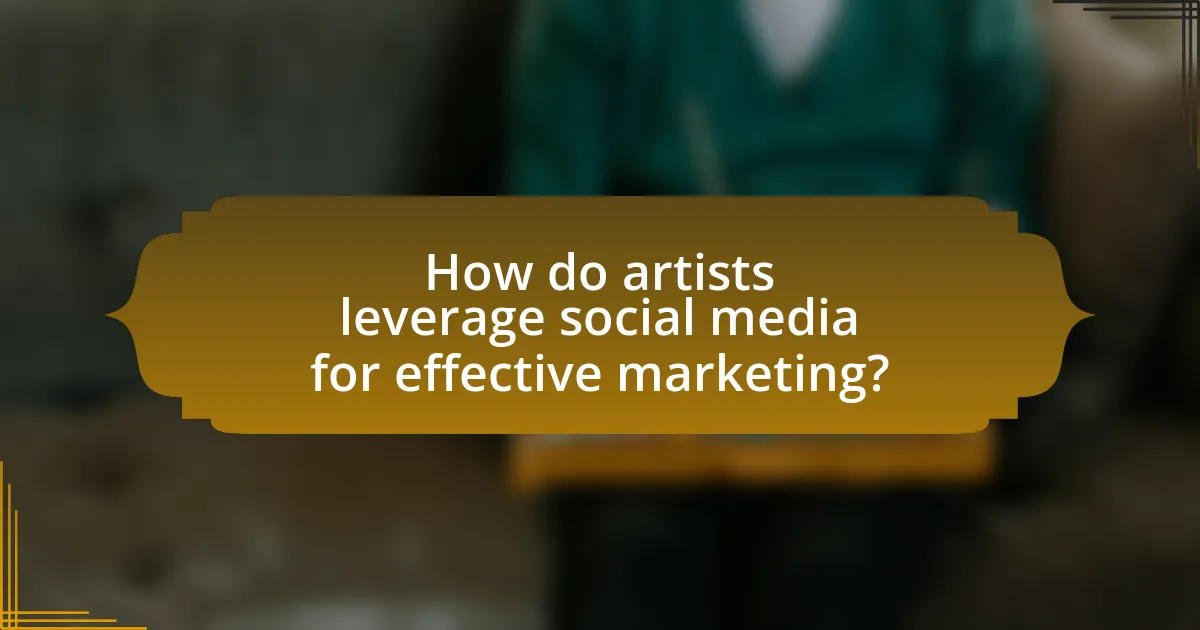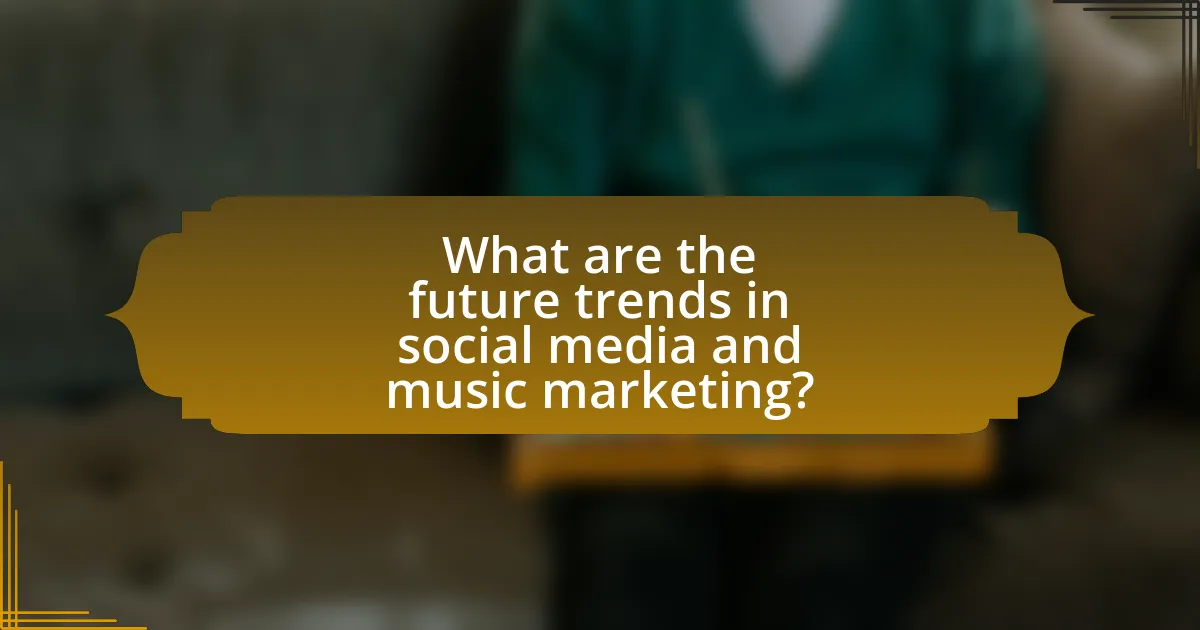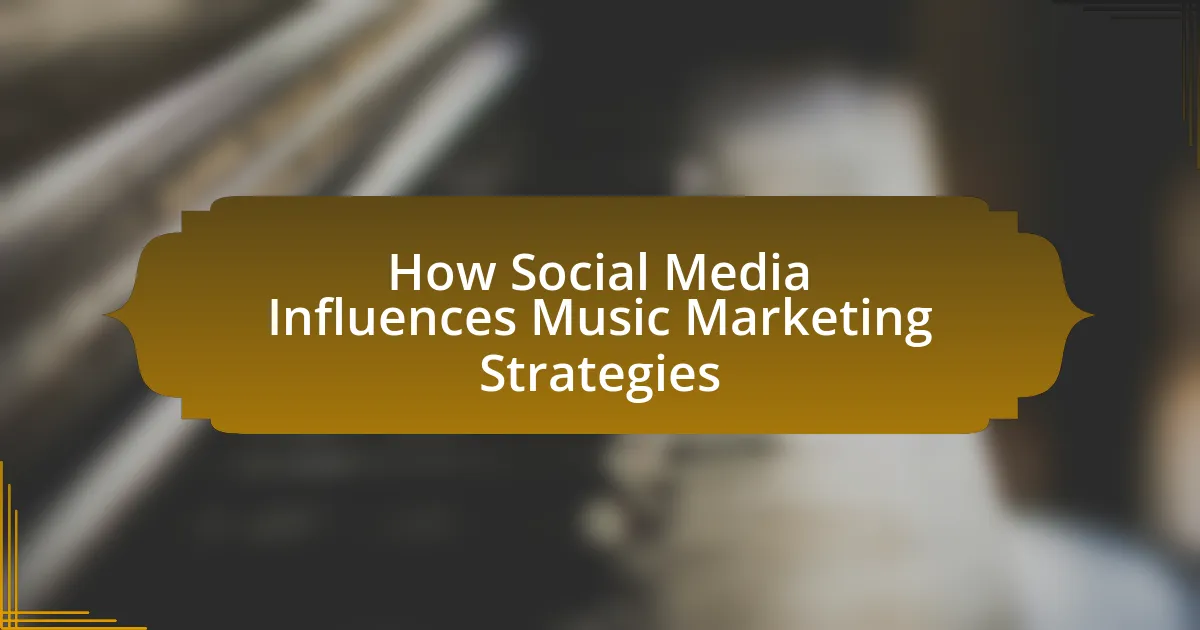The article examines how social media significantly influences music marketing strategies, highlighting the direct engagement between artists and their audiences on platforms such as Instagram, TikTok, and YouTube. It discusses the key platforms shaping music marketing, the unique features they offer for promotion, and how they cater to different music genres. Additionally, the article addresses the challenges artists face in social media marketing, the importance of data analytics, and emerging trends that are reshaping the landscape. It concludes with best practices for artists to maintain authenticity and effectively engage with their audience while promoting their music online.

How does social media impact music marketing strategies?
Social media significantly impacts music marketing strategies by enabling artists and labels to engage directly with their audience, fostering community and brand loyalty. Platforms like Instagram, TikTok, and Twitter allow musicians to share content, promote new releases, and interact with fans in real-time, which enhances visibility and reach. For instance, TikTok’s viral trends have propelled songs to chart-topping positions, demonstrating how user-generated content can amplify marketing efforts. According to a report by Nielsen, 70% of music listeners discover new music through social media, highlighting its critical role in shaping consumer behavior and marketing effectiveness in the music industry.
What are the key social media platforms influencing music marketing?
The key social media platforms influencing music marketing are Instagram, TikTok, YouTube, and Facebook. Instagram is widely used for visual storytelling and engaging with fans through posts and stories, making it essential for artists to showcase their brand. TikTok has rapidly gained prominence due to its viral nature, allowing music snippets to reach a vast audience quickly; for instance, songs that trend on TikTok often see significant increases in streaming numbers. YouTube serves as a primary platform for music videos and artist promotion, with billions of views contributing to an artist’s visibility and revenue. Facebook remains relevant for community building and event promotion, enabling artists to connect with fans and share updates. These platforms collectively shape music marketing strategies by enhancing audience engagement and expanding reach.
How does each platform cater to different music genres?
Each music streaming platform caters to different music genres through tailored playlists, genre-specific algorithms, and targeted marketing strategies. For instance, Spotify utilizes curated playlists like “RapCaviar” for hip-hop and “Peaceful Piano” for classical music, which attract specific audiences and enhance genre discovery. Apple Music offers genre stations and exclusive artist content, appealing to fans of various styles, while YouTube Music leverages user-generated content and music videos to engage diverse genres, from indie to mainstream pop. These strategies are supported by user data analytics, which help platforms refine their offerings and connect listeners with their preferred genres effectively.
What unique features do these platforms offer for music promotion?
Social media platforms offer unique features for music promotion, including targeted advertising, user-generated content, and analytics tools. Targeted advertising allows artists to reach specific demographics based on interests, location, and behavior, enhancing the effectiveness of promotional campaigns. User-generated content features, such as challenges and duets on platforms like TikTok, encourage audience engagement and virality, leading to increased exposure for artists. Additionally, analytics tools provide insights into audience behavior and engagement metrics, enabling artists to refine their marketing strategies based on real-time data. These features collectively enhance the ability of musicians to connect with fans and promote their work effectively.
Why is social media essential for modern music marketing?
Social media is essential for modern music marketing because it provides artists with direct access to their audience, enabling real-time engagement and promotion. Platforms like Instagram, TikTok, and Twitter allow musicians to share content, announce releases, and interact with fans, which fosters a sense of community and loyalty. According to a 2021 report by the International Federation of the Phonographic Industry, 70% of music consumers discover new music through social media, highlighting its critical role in reaching potential listeners. Additionally, social media advertising can target specific demographics, making marketing efforts more efficient and effective.
How does social media enhance audience engagement for artists?
Social media enhances audience engagement for artists by providing direct communication channels that facilitate interaction and feedback. Platforms like Instagram, Twitter, and TikTok allow artists to share content, respond to fans in real-time, and create a sense of community. For instance, a study by the Pew Research Center found that 72% of adults use social media, which artists can leverage to reach a broader audience and foster deeper connections. Additionally, social media algorithms promote content based on user engagement, meaning that artists who actively engage with their audience can increase their visibility and reach. This dynamic interaction not only boosts fan loyalty but also encourages user-generated content, further amplifying an artist’s presence and engagement.
What role does social media play in building an artist’s brand?
Social media is crucial in building an artist’s brand by providing a platform for direct engagement with fans and showcasing their work. Artists can share music, behind-the-scenes content, and personal stories, which fosters a deeper connection with their audience. According to a 2021 survey by the International Federation of the Phonographic Industry, 70% of music consumers discover new artists through social media platforms. This statistic highlights the effectiveness of social media in expanding an artist’s reach and visibility. Additionally, social media allows for targeted marketing campaigns, enabling artists to tailor their content to specific demographics, further enhancing brand identity and loyalty.
What challenges do artists face when using social media for marketing?
Artists face several challenges when using social media for marketing, including oversaturation of content, algorithm changes, and audience engagement. The oversaturation of content makes it difficult for individual artists to stand out, as millions of posts compete for attention daily. Additionally, frequent changes in social media algorithms can limit the visibility of an artist’s posts, making it harder to reach their target audience effectively. Furthermore, maintaining consistent audience engagement requires time and effort, which can be challenging for artists who may already be managing multiple aspects of their careers. These factors collectively hinder artists’ ability to effectively market themselves and their work on social media platforms.
How can negative feedback on social media affect an artist’s image?
Negative feedback on social media can significantly damage an artist’s image by influencing public perception and diminishing their credibility. When artists receive negative comments or reviews, it can lead to a decline in fan engagement and trust, as potential listeners may be swayed by the prevailing negative sentiment. Research indicates that 70% of consumers trust online reviews as much as personal recommendations, highlighting the impact of social media feedback on an artist’s reputation. Furthermore, negative feedback can result in decreased sales and streaming numbers, as fans may choose to support other artists perceived more favorably.
What are the common pitfalls in social media marketing for musicians?
Common pitfalls in social media marketing for musicians include inconsistent branding, neglecting audience engagement, and failing to analyze performance metrics. Inconsistent branding can confuse fans and dilute an artist’s identity, as seen when musicians use varying visuals or messaging across platforms. Neglecting audience engagement leads to missed opportunities for building a loyal fanbase; research indicates that 78% of consumers are more likely to buy from brands that engage with them on social media. Lastly, failing to analyze performance metrics results in missed insights that could optimize marketing strategies; for instance, 70% of marketers who track their social media performance report improved results.

How do artists leverage social media for effective marketing?
Artists leverage social media for effective marketing by utilizing platforms to engage directly with their audience, promote their work, and build their brand. Through consistent posting, artists can share updates about new releases, behind-the-scenes content, and personal stories that resonate with fans, fostering a sense of community. For instance, a study by the Pew Research Center indicates that 72% of adults use social media, providing artists with a vast audience to reach. Additionally, targeted advertising on platforms like Facebook and Instagram allows artists to promote their music to specific demographics, enhancing their marketing efforts. This strategic use of social media not only increases visibility but also drives fan interaction, leading to higher engagement rates and potential sales.
What strategies do successful artists use on social media?
Successful artists use targeted engagement, consistent content creation, and data analytics as key strategies on social media. Targeted engagement involves interacting with fans through comments, live sessions, and personalized messages, which fosters a loyal community. Consistent content creation, including regular posts, stories, and updates about their work, keeps the audience engaged and informed. Data analytics allows artists to track performance metrics, understand audience preferences, and optimize their content strategy accordingly. For instance, a study by the Pew Research Center indicates that 72% of teens use Instagram, highlighting the importance of platforms where their target audience is active.
How do artists create engaging content for their followers?
Artists create engaging content for their followers by utilizing a combination of authenticity, storytelling, and interactive elements. Authenticity allows artists to connect on a personal level, fostering trust and loyalty among their audience. Storytelling enhances engagement by creating a narrative that resonates with followers, making the content more relatable and memorable. Interactive elements, such as polls, Q&A sessions, and live performances, encourage active participation, which increases follower investment in the artist’s journey. According to a study by the Pew Research Center, 69% of adults in the U.S. use social media, highlighting the platform’s significance in reaching and engaging audiences effectively.
What role do collaborations play in social media marketing for musicians?
Collaborations play a crucial role in social media marketing for musicians by expanding their reach and enhancing audience engagement. When musicians collaborate, they tap into each other’s fan bases, which can lead to increased visibility and follower growth. For instance, a study by Nielsen Music found that collaborations can boost streaming numbers significantly, with tracks featuring multiple artists often achieving higher chart positions. This phenomenon occurs because fans of both artists are likely to share the content, amplifying its reach across various social media platforms. Additionally, collaborations often generate buzz and excitement, leading to more shares and interactions, which are vital for effective social media marketing.
How can data analytics improve music marketing on social media?
Data analytics can significantly enhance music marketing on social media by enabling targeted audience engagement and optimizing content strategies. By analyzing user data, such as demographics, listening habits, and engagement metrics, music marketers can identify specific audience segments that are most likely to resonate with their music. For instance, platforms like Spotify and Facebook provide insights into listener behavior, allowing marketers to tailor their campaigns to specific age groups or geographic locations.
Furthermore, data analytics helps in measuring the effectiveness of marketing campaigns through metrics like click-through rates and conversion rates. According to a report by Nielsen, targeted advertising can increase engagement by up to 50%, demonstrating the power of data-driven strategies in reaching the right audience effectively. This approach not only maximizes marketing budgets but also fosters stronger connections between artists and fans, ultimately driving sales and streaming numbers.
What metrics should artists track to measure success on social media?
Artists should track engagement rate, follower growth, reach, impressions, and conversion rate to measure success on social media. Engagement rate, calculated by dividing total interactions (likes, comments, shares) by total followers, indicates how well content resonates with the audience. Follower growth reflects the increase in audience size, which is crucial for expanding reach. Reach measures the total number of unique users who see the content, while impressions count how many times the content is displayed, regardless of clicks. Conversion rate, the percentage of users who take a desired action (like visiting a website or purchasing music), directly correlates social media efforts to tangible outcomes. Tracking these metrics allows artists to assess their social media effectiveness and adjust strategies accordingly.
How can insights from analytics inform future marketing strategies?
Insights from analytics can significantly inform future marketing strategies by providing data-driven understanding of consumer behavior and preferences. By analyzing metrics such as engagement rates, conversion rates, and audience demographics, marketers can identify which content resonates most with their target audience. For instance, a study by HubSpot found that companies using data analytics in their marketing strategies experienced a 20% increase in sales. This demonstrates that leveraging insights from analytics allows marketers to tailor their campaigns more effectively, optimize resource allocation, and enhance customer targeting, ultimately leading to improved marketing outcomes.

What are the future trends in social media and music marketing?
Future trends in social media and music marketing include the rise of short-form video content, increased use of artificial intelligence for personalized marketing, and the growing importance of influencer partnerships. Short-form videos, popularized by platforms like TikTok, have become essential for music promotion, as they allow artists to engage audiences quickly and creatively. AI technologies are being utilized to analyze listener preferences and tailor marketing strategies, enhancing user experience and engagement. Additionally, collaborations with influencers are proving effective in reaching niche audiences, as influencers can authentically connect with their followers, driving music discovery and consumption. These trends reflect the evolving landscape of digital marketing, where engagement and personalization are key to success.
How is technology shaping the future of music marketing on social media?
Technology is significantly shaping the future of music marketing on social media by enabling targeted advertising, data analytics, and interactive content. These advancements allow artists and labels to reach specific demographics more effectively, as platforms like Facebook and Instagram utilize algorithms to deliver ads based on user behavior and preferences. For instance, a study by the International Music Summit in 2021 revealed that 70% of music marketers believe social media advertising is crucial for reaching their audience. Additionally, data analytics tools provide insights into audience engagement, helping marketers refine their strategies. Interactive content, such as live streams and polls, fosters deeper connections between artists and fans, enhancing engagement and loyalty.
What emerging platforms should artists consider for marketing?
Artists should consider platforms like TikTok, Discord, and Clubhouse for marketing. TikTok has rapidly gained popularity, with over 1 billion monthly active users, making it a powerful tool for viral marketing and audience engagement. Discord offers a unique community-building experience, allowing artists to connect directly with fans through dedicated servers, fostering loyalty and interaction. Clubhouse, as an audio-based social networking platform, enables artists to host live discussions and engage with audiences in real-time, enhancing personal connections. These platforms are increasingly influential in shaping music marketing strategies, as they provide innovative ways to reach and engage with target audiences.
How will changes in consumer behavior affect music marketing strategies?
Changes in consumer behavior will significantly impact music marketing strategies by necessitating a shift towards more personalized and interactive approaches. As consumers increasingly seek authentic connections with artists and tailored experiences, music marketers must leverage data analytics to understand preferences and behaviors. For instance, a 2021 report by the International Federation of the Phonographic Industry (IFPI) indicated that 70% of music listeners prefer personalized recommendations, highlighting the need for targeted marketing campaigns. Additionally, the rise of social media platforms has transformed how consumers discover and engage with music, prompting marketers to create content that resonates with specific audience segments and encourages user-generated content. This evolution in consumer expectations drives the adoption of innovative marketing tactics, such as influencer partnerships and interactive live-streaming events, to enhance engagement and build community around music brands.
What best practices should artists follow for effective social media marketing?
Artists should focus on consistent branding, engaging content, and audience interaction for effective social media marketing. Consistent branding helps establish a recognizable identity, which is crucial for audience retention; studies show that brands with consistent presentation across platforms can increase revenue by up to 23%. Engaging content, such as behind-the-scenes videos, live performances, and interactive polls, fosters a deeper connection with followers, leading to higher engagement rates. Additionally, actively interacting with fans through comments and direct messages builds community and loyalty, which is essential in the music industry where personal connection can drive ticket sales and streaming numbers.
How can artists maintain authenticity while promoting their music online?
Artists can maintain authenticity while promoting their music online by staying true to their unique voice and engaging genuinely with their audience. This involves sharing personal stories, insights into their creative process, and being transparent about their experiences in the music industry. Research indicates that 70% of consumers are more likely to support brands that are authentic and transparent, highlighting the importance of genuine connections in music promotion. By prioritizing authenticity, artists can foster a loyal fan base that resonates with their true selves, ultimately enhancing their online presence and marketing effectiveness.
What are the key elements of a successful social media marketing plan for musicians?
The key elements of a successful social media marketing plan for musicians include audience engagement, content strategy, platform selection, analytics, and collaboration. Audience engagement involves actively interacting with fans through comments, messages, and live sessions, which fosters a loyal community. A well-defined content strategy ensures that musicians share a mix of promotional, entertaining, and behind-the-scenes content, keeping the audience interested. Selecting the right platforms, such as Instagram, TikTok, and YouTube, is crucial as different platforms cater to varying demographics and content types. Utilizing analytics tools helps musicians track performance metrics, allowing for data-driven adjustments to their strategies. Finally, collaboration with other artists and influencers can expand reach and introduce musicians to new audiences, enhancing visibility and engagement.
